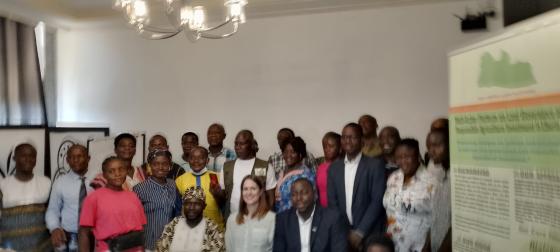MAP Liberia’s Private Sector Engagement Strategy Launched

Stakeholders in land governance and responsible agricultural investment have launched the Private Sector Engagement Strategy for the Multi Actors Partnership Platform on Land Governance in Liberia (MAP Liberia).
The strategy seeks to engage key players in the private sector whose activities impact land based investment in Liberia and especially impact the lives and rights of communities affected by investments.
It also aims to bring stakeholders together to discuss and raise awareness about the need to ensure Responsible Agricultural Investment (RAI) principles and other international, regional, and national policies and protocols for food and nutrition security improvement.
Launching the strategy on February 22, 2024, Grand Gedeh County, District #3 Lawmaker, Jacob C. Debee II called for the strengthening of the legal and regulatory framework governing land tenure and investment in agriculture in the country.
He said to make such happen, it requires enforcing laws that protect communities land rights and ensuring adherence to internationally recognized principles that aim to resolve land disputes swiftly and impartially.
He mentioned that Liberia has seen both the negative and positive impact of agricultural investment.
“While some projects have brought infrastructure, jobs, and market opportunities to rural areas, others have resulted in land disputes, displacement, and loss of livelihood for local communities. We can’t afford to repeat the mistakes of the past. Instead, we must strive for a model of development that is inclusive, equitable, and environmentally sustainable," she said.
It was incumbent upon the country to foster a conducive environment for responsible agricultural investment while upholding the principles of good land governance.
“This will require a multi stakeholder approach involving government agencies, civil society organizations, the private sector, and the local communities,” he explained.
Significant portion of the population and contributing to the country’s GDP. However, attracting investment in the sector must go hand in hand with safeguarding the rights of local communities, protecting the environment, and promoting inclusive growth, Irresponsible investment practices such as large scale land acquisition without proper consultation or compensation can exacerbate poverty, exacerbate our already dire food insecurity problem, and fuel social unrest.
The Grand Bassa County lawmaker said transparency and accountability must be embedded in all stages of land allocation and agriculture investment processes.
“The government must strengthen the public registry of land ownership and transactions, promote participatory land use planning, and strengthen the process of carrying out social and environmental impact assessments for all proposed investment projects,” he warned.
According to him, civil society organizations and the media play a crucial role in monitoring these processes and holding stakeholders accountable for their actions.
He called for the need for capacity building and raising awareness, which, according to him, is essential for empowering local communities to assert their land rights and negotiate for a fair deal with investment.
“This includes providing legal assistance, technical training, and financial literacy programs to vulnerable groups, particularly women and marginalized communities,” he mentioned.
He further mentioned that international cooperation and partnerships are indispensable for addressing transitional issues related to land governance and agriculture investment.
“Liberia can learn from the best practices and experiences of other countries while also leveraging support from international organizations, development partners, and private investors committed to the sustainable development goals,” he stated.
Providing an overview of the strategy, the National Project Coordinator of MAP Liberia, John F. Kelvin said the development of the Private Sector Investment Strategy started in 2022 with the goal of operationalizing the work of the MAP initiative.
He said MAP Land Platform, brings together CSOs, government of Liberia, Private Sector to ensure good land governance and responsible agricultural investment.
According to him, it was necessary to ensure Responsible Agricultural Investment principles and other international, regional, and national policies and protocols like the CAADP/Malabo goals, SDGs, the Voluntary Guidelines on the Responsible Governance of Tenure of Land Fisheries and Forests in the Context of National Food Security (VGGT) and among other policies.
He said the MAP strategy will engage key players in the private sector whose activities impact land based investment in Liberia and especially impact the lives and rights of communities affected by investments.
“To buttress the development agenda of the government of Liberia, the MAP Liberia Land Platform is actively engaged with key government line ministries and agencies, as well as development partners, to promote responsible investment in agriculture and food system that contributes to food security and nutrition which support the progressive realization of the right to food in the context of responsible agriculture investment,” he said.
